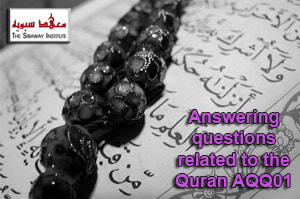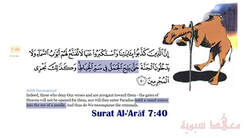AQQ : Answering Questions related to the Quran
-
COURSE SUMMARY
-
COURSE CURRICULUM
-
SAMPLE LESSON
-
JOIN OUR CLASS
<
>

A major problem that exist in understanding the Quran are translations of Quranic texts which are unable to capture the vast meanings of the Quranic discourse. Along with this is the complexity of classical Arabic which many students are unaware of. This module will answer the many questions asked by students of the Quran and will give them new insights into the beauty and eloquence of the Quran. This course will highlight the undeniable fact that the eloquence of the Qur’an is unprecedented and unmatched.
COURSE LESSONS
Question 1 - Regarding the attributes of Allah (Most High) at the end of certain ayaat, what is the difference between mentioning these attributes alone, with the particle Inna, with the weak verb Kana or with both Inna and Kana. [9:46 minutes]
Question 2 - Difference between سَمَآء and سَمَوَات. Analysis of 2:29. سَمَآء used as either a masculine and feminine noun. The many meanings of the word سَمَآء. Detailed explanation of the creation of the universe mentioned in 21:30 and 41:11-12. Comparison of 3:133 and 57:21.[32:29 minutes]
Question 3 - Why was the name of the father of Ibrahim Alahyisalam mentioned in 6:74 ? Why do some scholars say that he was not his real father? [6:06 minutes]
Question 4 - When talking about Maryam (A.S) why was فِيهِ used in 66:12 and فِيهَا used in 21:91. A non Muslim site was claiming a linguistic error. [7:12 minutes]
Question 5 - Why is the word zawj used for Hawa in the Quran 2:35? Why was the ending of ayah 50 and 51 in Surat Athariyat the same? [14:01 minutes]
Question 6 - In Surat Al Israa Ayah 78, it mentions the word Dulook, some translations say that it means declining and some say it means setting. What is its real meaning? Why are there only 3 times frames mentioned in the Quran thus giving support to the Shia view of joining prayers during the 3 time frames? [9:54 minutes]
Question 7 - In 66:5 it mentions a number of attributes of righteous women. One of the attributes mentioned is traveling and I don't know the significance of why this attribute was mentioned. Also, the last 2 attributes mentioned are "previously married" and "virgins" and obviously it would need to be the one or the other since they are opposites, so why was this mentioned ? [6:10 minutes]
Question 8 - The rhetorical aspects related to ( وَهُوَ عَلَىٰ كُلِّ شَيْءٍ قَدِيرٌ) , " And He is capable over all things" [12:15 minutes]
Question 9 - I was reading an Iraab of the ayah 7:155 and the translation it uses is "from his people" yet the harf jaar min is not present. How does one justify the translation and why was the min omitted? [5:18 minutes]
Question 10 - What is the difference between using Naasir, the active participle and Naseer, intensive active participle? 86:10 vs 33:65? [7:49 minutes]
Question 11 - One of the signs of an Ism is that it can be invoked using a particle of invocation such as Yaa. Why then in 36:26 is a verb being invoked? [4:44 minutes]
Question 12 - In Surat Al Baqarah Ayah 138, it uses the term Sibghata Allah. I have seen translations like "the coloring of Allah". Can you please explain this? [7:34 minutes]
Question 13 - In Ayah 3 of Surat Aly Imran, the verb form used for the Quran (نَزَّلَ) is different to the Tawraat and Injeel (أَنزَلَ)? Why was the verb form (أَنزَلَ) used for the Furqan (The Quran) in the very next Ayah? Why was the sending of the Quran mentioned twice, in Ayahs 3 and 4? Why was the past tense used for the sending of the Quran when it hadn't been revealed completely ? [9:01 minutes]
Question 14 - In Surat Al mudathir it mentions a similitude of donkeys running away from a lion. What is the significance of using this similitude? Why was the word Humur (donkeys) and Qaswara (lion) used in the Ayah? [6:54 minutes]
Question 15 - Who is Al-Samiri who is mentioned in Surat Taha? [9:14 minutes]
Question 16 - What is the significance in the Quran 60:10 regarding the usage of the Noun ( حِلٌّ ) and the verb ( يَحِلُّونَ ) within the same context? [11:57 minutes]
Question 17 - Why is death emphasised twice while resurrection only emphasised once in Quran 23:15-16? [7:41 minutes]
Question 18 - Who is Al-Samiri who is mentioned in Surat Taha? (Includes others points related to the story of Musa AS and Bani Israel crossing the sea.) [20:03 minutes]
Question 19 - Can you explain the exception إلّا الله in ayah 21:22 ? [8:25 minutes]
Question 20 - Why was the verb كَانَ used in Quran 60:6 for أسوة considering it is a feminine noun and in Quran 60:4 it is referred to using a feminine verb? [19:46 minutes]
Question 21 - A brief response regarding evolution. Does the Quran speak about it ? [5:35 minutes]
Question 22 - What is the relevance of mentioning Ayahs 8 and 9 in the context of Surat Al Takwir? [16:27 minutes]
Question 23 - Does the Quran mention who the actual Pharaoh of Egypt was at the time of Musa AS? [15:17 minutes]
Question 1 - Regarding the attributes of Allah (Most High) at the end of certain ayaat, what is the difference between mentioning these attributes alone, with the particle Inna, with the weak verb Kana or with both Inna and Kana. [9:46 minutes]
Question 2 - Difference between سَمَآء and سَمَوَات. Analysis of 2:29. سَمَآء used as either a masculine and feminine noun. The many meanings of the word سَمَآء. Detailed explanation of the creation of the universe mentioned in 21:30 and 41:11-12. Comparison of 3:133 and 57:21.[32:29 minutes]
Question 3 - Why was the name of the father of Ibrahim Alahyisalam mentioned in 6:74 ? Why do some scholars say that he was not his real father? [6:06 minutes]
Question 4 - When talking about Maryam (A.S) why was فِيهِ used in 66:12 and فِيهَا used in 21:91. A non Muslim site was claiming a linguistic error. [7:12 minutes]
Question 5 - Why is the word zawj used for Hawa in the Quran 2:35? Why was the ending of ayah 50 and 51 in Surat Athariyat the same? [14:01 minutes]
Question 6 - In Surat Al Israa Ayah 78, it mentions the word Dulook, some translations say that it means declining and some say it means setting. What is its real meaning? Why are there only 3 times frames mentioned in the Quran thus giving support to the Shia view of joining prayers during the 3 time frames? [9:54 minutes]
Question 7 - In 66:5 it mentions a number of attributes of righteous women. One of the attributes mentioned is traveling and I don't know the significance of why this attribute was mentioned. Also, the last 2 attributes mentioned are "previously married" and "virgins" and obviously it would need to be the one or the other since they are opposites, so why was this mentioned ? [6:10 minutes]
Question 8 - The rhetorical aspects related to ( وَهُوَ عَلَىٰ كُلِّ شَيْءٍ قَدِيرٌ) , " And He is capable over all things" [12:15 minutes]
Question 9 - I was reading an Iraab of the ayah 7:155 and the translation it uses is "from his people" yet the harf jaar min is not present. How does one justify the translation and why was the min omitted? [5:18 minutes]
Question 10 - What is the difference between using Naasir, the active participle and Naseer, intensive active participle? 86:10 vs 33:65? [7:49 minutes]
Question 11 - One of the signs of an Ism is that it can be invoked using a particle of invocation such as Yaa. Why then in 36:26 is a verb being invoked? [4:44 minutes]
Question 12 - In Surat Al Baqarah Ayah 138, it uses the term Sibghata Allah. I have seen translations like "the coloring of Allah". Can you please explain this? [7:34 minutes]
Question 13 - In Ayah 3 of Surat Aly Imran, the verb form used for the Quran (نَزَّلَ) is different to the Tawraat and Injeel (أَنزَلَ)? Why was the verb form (أَنزَلَ) used for the Furqan (The Quran) in the very next Ayah? Why was the sending of the Quran mentioned twice, in Ayahs 3 and 4? Why was the past tense used for the sending of the Quran when it hadn't been revealed completely ? [9:01 minutes]
Question 14 - In Surat Al mudathir it mentions a similitude of donkeys running away from a lion. What is the significance of using this similitude? Why was the word Humur (donkeys) and Qaswara (lion) used in the Ayah? [6:54 minutes]
Question 15 - Who is Al-Samiri who is mentioned in Surat Taha? [9:14 minutes]
Question 16 - What is the significance in the Quran 60:10 regarding the usage of the Noun ( حِلٌّ ) and the verb ( يَحِلُّونَ ) within the same context? [11:57 minutes]
Question 17 - Why is death emphasised twice while resurrection only emphasised once in Quran 23:15-16? [7:41 minutes]
Question 18 - Who is Al-Samiri who is mentioned in Surat Taha? (Includes others points related to the story of Musa AS and Bani Israel crossing the sea.) [20:03 minutes]
Question 19 - Can you explain the exception إلّا الله in ayah 21:22 ? [8:25 minutes]
Question 20 - Why was the verb كَانَ used in Quran 60:6 for أسوة considering it is a feminine noun and in Quran 60:4 it is referred to using a feminine verb? [19:46 minutes]
Question 21 - A brief response regarding evolution. Does the Quran speak about it ? [5:35 minutes]
Question 22 - What is the relevance of mentioning Ayahs 8 and 9 in the context of Surat Al Takwir? [16:27 minutes]
Question 23 - Does the Quran mention who the actual Pharaoh of Egypt was at the time of Musa AS? [15:17 minutes]

Question 24 What is meant by " ....Heaven will not be opened for them, nor will they enter Paradise until a camel enters into the eye of a needle". Surah 7:40 [8:09 minutes]
Question 25 - In Surat Al Maidah Ayah 65 it mentions that Allah has 2 hands, do we take this literally? [17:37 minutes]


